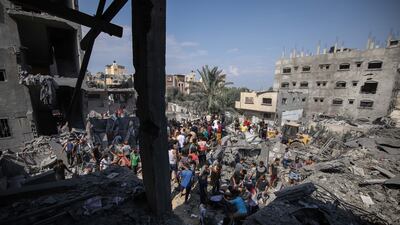Displaced Palestinians who have survived Israeli bombardment could lose their lives to dehydration and disease as the population faces a years-long struggle towards recovery, leading aid organisations said on Thursday.
“It is spiralling into a humanitarian catastrophe that will take years, not months, to recover from. An immediate ceasefire is imperative,” said Shaina Low, of the Norwegian Refugee Council, at a media briefing with other aid organisations.
More than 1.9 million people, or 85 per cent of the population, have been internally displaced more than once since the war began, according to the UN. Shelters are “overcrowded” and some families with infants are sleeping outdoors, aid group representatives said.
Israel published an evacuation map of Gaza this week in efforts to reduce civilian deaths, and designated the deserted area of Al Mawasi as a “safe zone”.
Aid organisations are unable to operate safely due to the intensity of Israeli bombardment, they said, yet the information received from inside Gaza are bleak. Children are believed to be going without food for more than 10 days in some instances, according to Save the Children’s Alexandra Saieh.
Nine out of 10 people spent at least one full day and night without food, whereas almost one in five (18 per cent) had reported spending more than 10 days in the past month without food, according to a report by the World Food Programme.
“Our staff have told us that this is significantly worse for children in Al Mawasi,” Ms Saieh said.
The lack of clean water and sanitation due to the siege has contributed to the spread of diseases, including an outbreak of hepatitis A.
There have been 44,000 case of diarrhoea, more than half of these affecting children under five, according to Chiara Saccardi of Action Against Hunger.
The siege has been compounded by the limited humanitarian aid lorries that have been allowed to enter Gaza.
The recent seven-day truce allowed for an increase in aid entering Gaza to about 300 lorries a day. Now, an average of 100 lorries a day is entering the enclave, according to Jesse Marks, of Refugee International.
This is not enough to sustain the population.
“It’s simple. There’s too little aid with too many people to satisfy,” said Ms Saccardi.
The checks on humanitarian aid at the border needed more transparency, as aid agencies are unable to name the source of the delays in getting aid through.
“It's not completely transparent for us the process. The check is done in Egypt at the demand in Israel, but we have no idea who has the final word,” said Isabelle Defourny, of Doctors Without Borders (MSF).
The limited amount of aid is causing tension in communities during distributions, making it unsafe for aid workers to carry them out.
Ms Defourny confirmed reports of the looting of a medical vehicle that was parked outside a pharmacy this week in Al Mawasi by people who had thought it would contain food.
“We have no evidence that it was organised by Hamas – it was a reflection of the terrible situation,” she said.
Aid agencies fear the consequences of the ongoing bombardment will be severe and long lasting.
“What we're talking about is not just a near term, skyrocketing catastrophe, we're talking about a long drawn out protracted catastrophe, which has limited ability to scale or improve the longer the strikes against critical infrastructure occur,” said Mr Marks.


